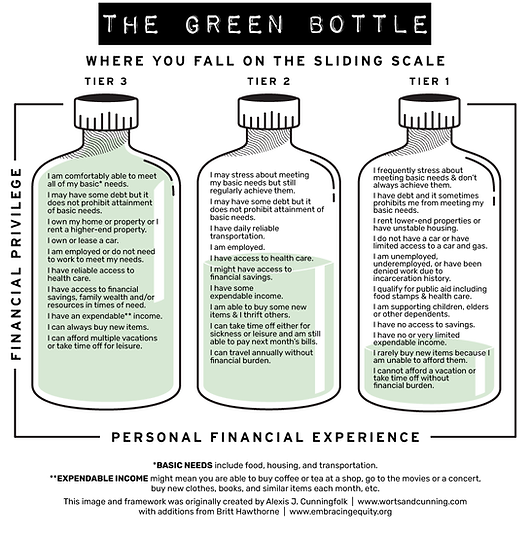
Assessment for ADHD & Autism
Diagnosis of ADHD and Autism within the neurodivergent community is a complex and nuanced issue.
Please see below our reasoning for providing assessments, our goals during those assessments, as well as our commitment to making this service accessible to those who want it and need it.
Why does a neurodiversity-affirming practice offer assessments?
Holding radical hope for liberation while navigating current systems
At Unbound & Transformed, we do believe individuals with ADHD or Autistic neurotypes are NOT "disordered." We believe that ADHD & Autism are part of the natural human variation of neurodiversity that exists in our world.
Ideally, our society would be constructed to support, honor, and cherish the variety of needs, nervous systems, and ways of being that exist in this world. In this paradigm, diagnosis wouldn't be necessary to receive support or validation. We would all be able to access the care we need without shame or gatekeeping.
However, for many, diagnosis is the old way to access much-needed accommodations, to have language to describe their internal experiences, and to be able to let go of internalized shame. Our goal is to provide this option to our community in a way that is as affirming as possible, that honors our clients' self knowledge, and allows those who need it ways to access accommodations and supports.
What are the downsides to diagnosis?
Diagnosis is not always the answer
Part of our goal to hold the nuance of challenging systems of oppression (such as pathologizing neurotypes) while also supporting client in navigating inherently ableist and oppressive systems, is to name the potential harm that can come from receiving an ADHD or Autism diagnosis.
Being diagnosed with Autism can prevent access to asylum in certain countries. It can lead to stigmatization by health care providers and other professionals in ways that undermine your autonomy and question your capacity to make your own decisions.
A diagnosis does not erase internalized ableism and the impacts of neuronormativity. It does not change systems that make a diagnosis necessary to accessing care. It does not challenge those who see us as "disordered," "broken," "less human."
For further breakdown of the risk/benefit, please see this PDF created Neuroabundant and NeuroPebble
I thought you needed to be a PhD or PsyD to diagnosis autism?
Not necessarily--it's complicated.
This is a common misconception AND it varies from state to state.
In Colorado, LPCs, LMFTs, and LCSWs are able to diagnose, as stated in our statutes. Each ethics body that oversees different licensure tracks has different guidelines as to what a clinician's scope of practice is.
Typically, many LPCs, LMFT, and LCSWs do not have the experience working with Autistic individuals to be familiar enough with the diagnostic criteria and the variety of presentations. Additionally, assessment procedures often require specialized training, and certain assessments might require doctoral-level education.
Ultimately, master's level clinicians are asked to self-evaluate whether we have the necessary training and experience for diagnosing and to act within our professional competency.
Our clinicians who perform these assessments have worked extensively with Autistic and ADHDers, received specialized training, and engage in ongoing supervision from assessors with many more years of experience assessing and working with ADHDers and Autists. Additionally, they are also AuDHDers themselves and bring their lived experiences along with their professional expertise to the process.
However, please note that the type of assessment report that our clinicians can write is not be sufficient for certain needs, such as disability determination. These assessment are primarily for self-knowledge, school and work place accommodations, and advocacy support.
The Process
Below is a breakdown of the process of being assessed.

Self-Assessment
Reports
After filling out informed consent paperwork, there are a series of self-report measures that you will be asked to do to support the assessment process. While none of these assessments alone can diagnose or rule out ADHD or Autism, they act more data points for the clinician to begin to understand your internal experience of the world.

Assessment Report Writing
If your hope is to just receive a diagnosis for yourself, reviving an full assessment report can still provide an explanation of our reasoning for a particular diagnosis, AND we also understand that given the current socio-political climate many do not want ASD attached to their medical records. We are happy to work with you and develop a report that matches your needs and wants.

Assessment
Interview
A major part of any assessment is a clinical interview(s). For adults, we plan for about 2 hours to work through your history and current experience, as well as gain more information on anything the self-assessments might have illuminated.

Assessment Review Session
After the completion of the assessment, there will be a session to go over our findings and collaborate with you on any relevant next steps you’d like assistance with.
We also can make small changes or add additionally details depending on your feedback of the report.

Support System Assessment Interview
We also plan for a 1-hour interview for those who might be considered the "supporting cast" of the person seeking a diagnosis. This could be parents, siblings, chosen family, friends, partners, therapists, co-workers, etc. This is not a necessary piece of the assessment process, but it often can provide valuable information that help provide deeper clarity and understanding to your experiences.

Receive Relevant Documents & Referrals
You will receive final versions of your reports, accommodation letters, or any other requested documents with any final revisions that were decided upon at your review session.

Records
Review
If possible, we also try to look at records or documents that might give us insight into your experiences in work or academics. Additionally, many individuals have had ADHD or ASD previously considered by other clinicians, but due to poor training on these diagnoses had them ruled out for inaccurate reasons (example: you can’t be Autistic because you were assigned female at birth).
Assessment Pricing Tiers
We use the Green Bottle Scale to allow those with less financial stability to access care at a discounted rate

* Basic Needs include food, housing, health care, and transportation.
** Expendable Income might mean you are able to buy coffee or tea at a shop, go to the movies or a concert, buy new clothes, books, and similar items each month, etc.
